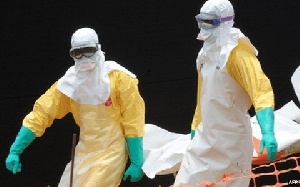In a speech delivered on her behalf at a conference in the Philippines, Ms Chan said Ebola was a historic risk.
"I have never seen a health event threaten the very survival of societies and governments in already very poor countries," she said. "I have never seen an infectious disease contribute so strongly to potential state failure."
She warned of the economic impact of "rumours and panic spreading faster than the virus", citing a World Bank estimate that 90% of the cost of the outbreak would arise from "irrational attempts of the public to avoid infection".
Ms Chan also criticised pharmaceutical firms for not focusing on Ebola, condemning a "profit-driven industry [that] does not invest in products for markets that cannot pay".
The latest outbreak has killed at least 4,033 people in Liberia, Sierra Leone, Guinea and Nigeria since it was identified in March.
Health workers are among those most at risk of catching the disease. Ninety-five have died from the virus in Liberia.
Liberia's National Health Workers Association had called for a strike to demand an increase in the fee paid to those treating Ebola cases.
The union is seeking a risk fee of $700 (£434) a month. It is currently less than $500, on top of basic salaries of between $200 and $300.
The association also wants more protective equipment and insurance for workers.
On Monday, the association's secretary-general, George Williams, said the government had put some health workers under "duress" and persuaded them to work.
The government says the scale of the epidemic means it now cannot afford the risk fee originally agreed. It warned that a strike could also harm patients.
Information Minister Lewis Brown said the government had asked health workers to be reasonable. "We are working with them the best way we possibly can," he said.
Six months after the epidemic began in West Africa, there are still only about a quarter of the treatment beds required to tackle it.
Food is now in short supply as markets are disrupted in some parts of Liberia, Sierra Leone and Guinea.
General News of Tuesday, 14 October 2014
Source: BBC













